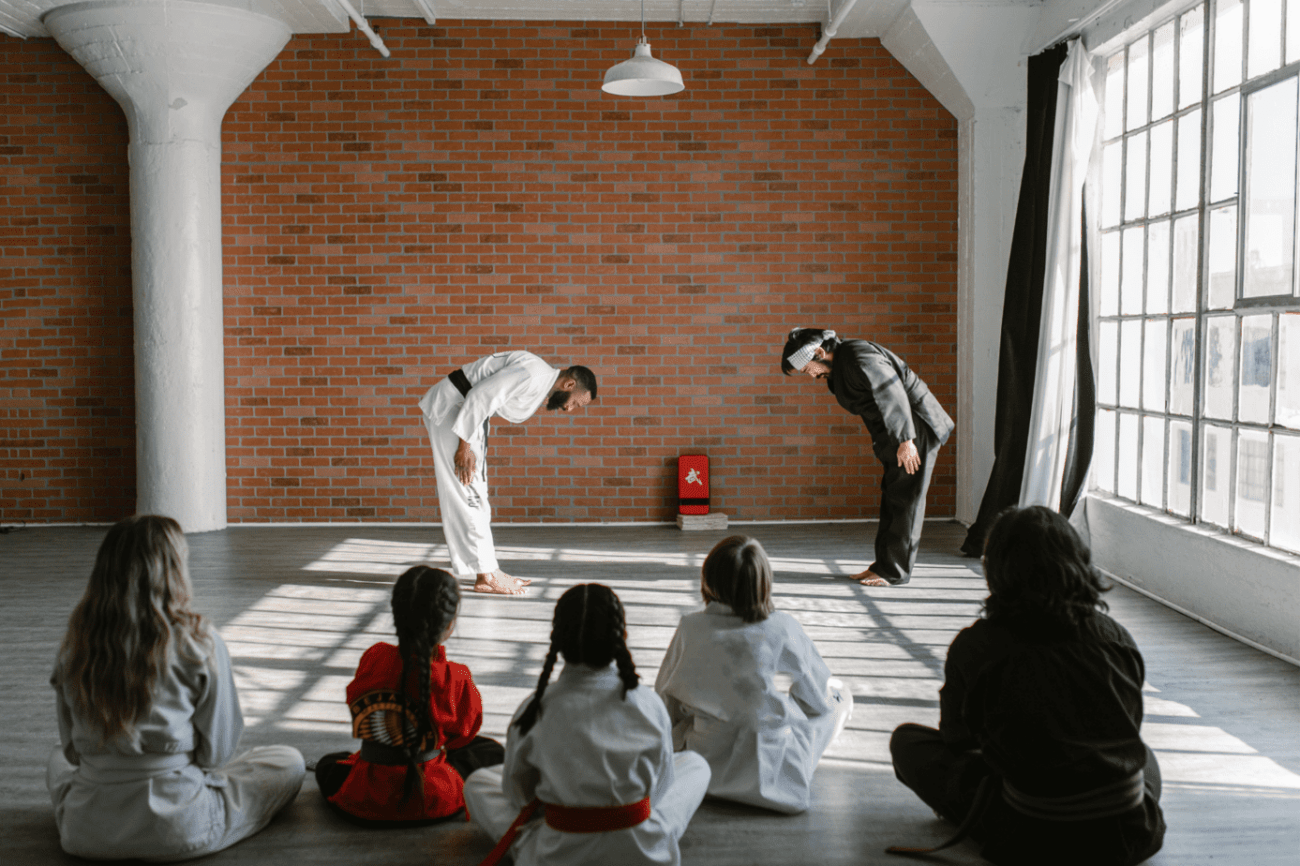The dojo, often associated with martial arts, embodies much more than just a physical space. It serves as a sanctuary for deep meditation and a hub for learning.
Envisioned as a school or a practice hall, the dojo transcends these definitions to become a revered space where individuals enhance both their mental and physical prowess.
While it’s true that any training facility or drill hall might be referred to as a dojo, it’s important to appreciate its broader significance. The dojo is not just a location; it’s a journey of personal growth and mastery, a place where discipline meets tranquility, and where every step on the mat leads to self-discovery.
What Does DOJO Mean?
“Dojo” is a term steeped in tradition, originating from the Japanese martial arts world, yet its meaning extends far beyond a mere physical location. At its core, a dojo is a sacred space dedicated to learning, practice, and personal growth. The word itself, composed of “do” (way or path) and “jo” (place), literally translates to “place of the way.” This encapsulates the essence of what a dojo represents: a venue for pursuing the path of mastery, whether in martial arts or other disciplines.
In martial arts, a dojo is more than just a training hall; it’s a realm where respect, discipline, and the pursuit of excellence converge. It’s a place where students learn not only physical techniques but also imbibe the philosophical and ethical aspects of the discipline. The dojo serves as a microcosm of the journey one undertakes in martial arts, emphasizing respect, perseverance, and self-improvement.
However, the concept of a dojo has evolved to encompass any space where learning and practice occur in a disciplined and respectful environment. It could be a room where meditation or yoga is practiced, a studio for artistic pursuits, or even a modern workplace dedicated to professional development. In each case, the dojo symbolizes a commitment to continuous learning and personal development.
In essence, a dojo is a sanctuary for growth, a place where one embarks on a transformative journey of self-discovery and mastery. It’s a space where the physical and the spiritual meet, fostering an environment of respect, discipline, and continuous improvement.
According to the Merriam-Webster dictionary, the definition is “a school for training in various arts of self-defense”.
Yet, the Collins-English dictionary is also a great source. Its definition is “a school or practice hall where Karate, Judo, or other martial arts are taught”.
The slang “dojo” mostly relates to the place where you train or learn, but it doesn’t have to be related to Japanese arts.
And now let’s take a look at the Japanese language. Do means “a path, way of a road”, while Jo refers to “place”. The translation of dojo is “a place of the way”.
What Is Dojo?
And now let’s transition to the Cambridge English language dictionary’s definition – it is a place where you train in Karate, Judo, or other martial arts (fighting sports). This word mostly relates to training in Japanese fighting styles, but it can also relate to the practice of other disciplines – wrestling, MMA, Chinese kung fu, Muay Thai…
You can even turn the room into your dojo, it is a place where you boost your skill set. Does the syntax “dojo” have a great meaning for you? Do you see the piece of your house as the area to improve yourself? Well, congrats, you made a modified version of the dojo!
Origin Of Dojo
The origin of the term “dojo” traces back to ancient Japan, deeply rooted in the rich tapestry of Japanese culture and martial arts tradition. The word “dojo” is derived from two Japanese characters: “do,” meaning “way” or “path,” and “jo,” signifying “place” or “hall.” Historically, it referred to a place for meditation and training in the ways of Buddhism, particularly within Zen temples.
As martial arts began to flourish in Japan, the concept of the dojo evolved. It transformed into a dedicated space where martial arts practitioners, or samurai, honed their skills. These dojos were not just physical training grounds; they were revered spaces where the samurai cultivated discipline, moral character, and the philosophical aspects of their art. The dojo became a microcosm of the martial way of life, emphasizing not only physical prowess but also mental and spiritual growth.
Over time, the dojo’s significance transcended martial arts. It came to represent any place where one seeks to learn and master a discipline, whether in arts, crafts, or other fields. The traditional values of respect, discipline, and continuous improvement remained central to the dojo’s ethos.
Let’s travel back to the Nara period (710 AD – 84). The term was used for private religious gatherings and temples. In the Kamakura period (1192-1333), the dojo used to be a name for chapels in Buddhist sects.
But here is a surprise. The word dojo is actually of Buddhist origin and relates to the Sanskrit word “Bodhimanda”, a saint spot where Buddha attained enlightenment. You might see the Sanskrit “bodhi manda seat” syntax in some literature and writings, but its meaning is not much different.
Today, while dojos are commonly associated with martial arts, their essence remains unchanged. They are sanctuaries of learning and personal development, embodying a journey towards mastery in various aspects of life. The dojo, in its essence, is a testament to the enduring pursuit of excellence and the transformative power of dedicated practice.
Is Dojo Only For Karate?
A dojo is mostly related to Japanese martial arts, but it could be a training facility for all kinds of fighting styles. It can also be for Judo, Sanshou, Kyudo, kung fu, Sambo…
Dojo In Different Martial Arts
When it comes to Japanese martial arts, there are rituals like cleaning, standing bow, and strict discipline. “Dojo Kun” are rules in Japanese dōjō schools, and there are pieces of training equipment on the walls too. The same name can be used outside of Japan too.
Here are word lists for different fighting styles. In Indian culture, this saint place is called “Akhara”. South Korean has its word for the area where you boost your skills – Dojang. For Chinese martial arts, you’ll hear the words “Kung fu Dojo” or “Wuguan”. The Vietnamese name is “Vo Doung”, while in Indonesia, you will hear the word “Sasaran”. In Malaysia, it is “Gelanggang”.
Dojang Vs Dojo
Dojang is a Korean word for the training area where you can train in Taekwondo and other Korean styles, while dojo relates to Japanese fighting classes. But generally, it refers to the same topic. There is only one difference between the words – writing.
How To Pronounce DOJO?
The Japanese pronunciation of the word dojo, written with the phonetic transcription, is [doꜜː(d)ʑoː]
Are Dojo And Karate The Same?
No. Dojo mostly relates to the system of Japanese martial arts, but Japanese dōjō is also different. Please make a difference, Karate is a martial art, dojo has a way deeper meaning.
Who Runs A Dojo?
In Japanese fighting styles, the person is called a “karateka”. Yet, every single art has a different name for the person who runs it.

